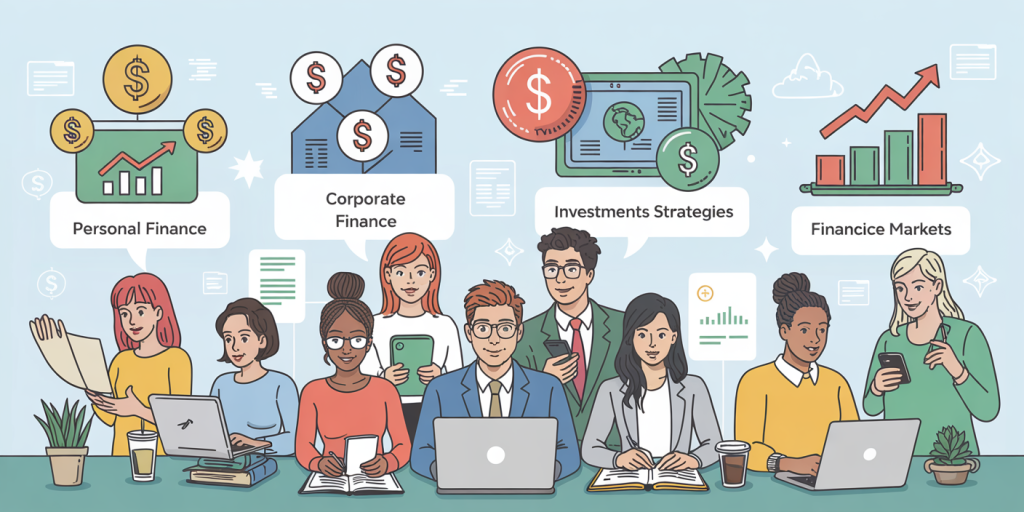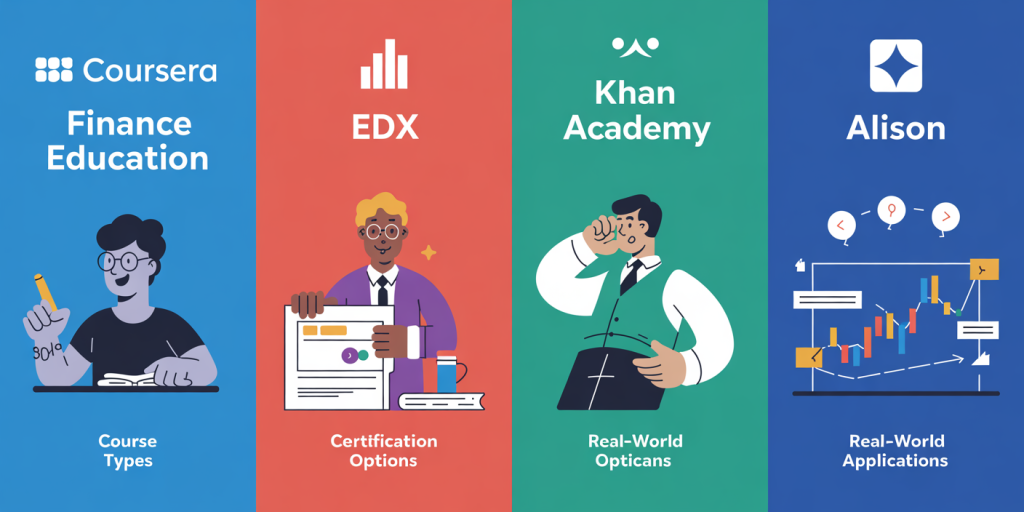Top Free Online Platforms for Finance Courses
In today’s fast-paced digital era, acquiring financial knowledge is no longer confined to traditional classrooms. Online education platforms have revolutionized how individuals learn about finance by offering accessible, flexible, and in many cases, free courses. Whether you are a student, a finance professional, or simply an enthusiast eager to understand personal finance, corporate finance, investment strategies, or financial markets, free online platforms provide an invaluable opportunity to upgrade your skills without spending a dime.

Financial literacy has become critical, especially with the increasing complexity of global markets and personal finance tools. According to a 2022 FINRA report, only 57% of Americans were financially literate, underscoring the urgency for quality education in this domain. Fortunately, various online platforms offer comprehensive finance courses that cater to beginners and experts alike, enabling users to strengthen their understanding and apply it in real-world scenarios.
Why Free Finance Education Matters in the Digital Age
The democratization of finance education through free online platforms has played a pivotal role in closing the knowledge gap across demographics and geographies. Financial education equips individuals with the tools to manage debt, invest wisely, and plan long-term savings, which can radically improve their economic well-being. For example, consider the rise of retail investors in markets like the U.S. and India, driven by increased accessibility to financial knowledge and tools. This trend highlights how free education initiatives empower everyday people to participate actively in financial markets.
Additionally, free online finance courses help professionals reskill amid changing industry demands. Finance roles are evolving rapidly, with advancements in fintech, blockchain, and data analytics shaping the landscape. Platforms offering courses on these emerging trends allow learners to stay competitive without the financial burden of traditional education. This shift also aligns with the forecasts by Global Market Insights, citing that the e-learning market for finance-related disciplines is expected to grow by 14% annually through 2027.
Coursera: Trusted Certification from Top Universities
Coursera stands out as one of the leading MOOCs (Massive Open Online Courses) platforms, offering finance courses from prestigious institutions like the University of Illinois, Yale, and the University of Michigan. Their free-tier audit option allows learners to access many course materials without paying, including video lectures, readings, and quizzes. Notable courses include “Financial Markets” by Yale University, taught by Professor Robert Shiller, a Nobel laureate in Economics. This course dives deep into the functioning and importance of global financial systems, providing both foundational knowledge and practical insights.
A practical example here is the huge enrollment rates seen in Coursera’s finance courses. The “Financial Markets” course has attracted over 700,000 learners globally since its launch. Its real-life case analyses of financial crises and market behaviors help users understand concepts like liquidity risk, portfolio diversification, and asset bubbles—critical topics for investors and professionals alike.
| Platform | Course Type | Institution/Provider | Certification | Cost |
|---|---|---|---|---|
| Coursera | Full Courses, Specializations | Yale, University of Illinois | Paid certificate optional | Free audit available |
| edX | MicroMasters, Professional Certificate | MIT, Harvard | Paid certificate optional | Free audit available |
| Khan Academy | Short Lessons | Internal Content | No | Fully free |
| Alison | Diplomas, Certificates | Internal | Yes | Fully free |
edX: Comprehensive Finance Curriculum with Flexibility
Founded by Harvard and MIT, edX is synonymous with high-quality academic content. It offers an extensive range of free finance courses, from introductory personal finance to advanced topics such as corporate finance and financial analysis. Like Coursera, many courses can be audited for free, with optional paid certificates for professional validation.
One standout course is “Introduction to Corporate Finance” by the University of Michigan, which provides a step-by-step guide to capital budgeting, discounting cash flows, and risk assessment. Students benefit from hands-on case studies that simulate decision-making challenges faced by CFOs, enhancing the practical value of the learning experience.
Moreover, edX doesn’t just focus on theory. Its MicroMasters programs offer a pathway toward professional mastery, which is attractive for users looking to advance careers in financial services or investment banking. For example, the MicroMasters in Finance from the University of Maryland helps learners build quantitative skills and analytical reasoning needed for roles in asset management or financial consulting.
Khan Academy: Simplified and Accessible Finance Courses
Khan Academy emphasizes ease of understanding and accessibility, making it ideal for beginners and those seeking to improve their foundational financial literacy. With over 150 million yearly learners across various disciplines, its finance and economics section covers topics such as interest rates, bonds and stocks, mortgage basics, and behavioral economics.
What sets Khan Academy apart is its free, ad-free model supported by donations, allowing users to access all content without any hidden costs. The platform utilizes intuitive visuals and interactive quizzes suited for self-paced learning, targeting high school students, college entrants, and adults seeking practical financial skills.
For instance, a user interested in real estate investment can find well-explained modules on mortgages, amortization schedules, and calculating return on investment—critical knowledge areas for potential homebuyers or property investors. Khan Academy’s practical approach assists users in making informed decisions in everyday financial matters, from budgeting to retirement planning.
Alison: Diploma-Level Courses for Career Boosting
Alison occupies a unique niche, offering free diploma and certificate courses in finance, accounting, and banking. Its courses are designed to equip learners with workplace-ready skills, compatible with professional standards in various industries. Many of Alison’s courses focus on employability and practical business applications, attracting career switchers and young professionals.
Courses like “Diploma in Financial and Management Accounting” take students through bookkeeping, accounting cycles, financial statement analysis, taxation, and budgeting. These comprehensive courses make it feasible for users to curate a strong finance portfolio without university enrollment.
A practical reference is how some users have leveraged Alison diplomas to supplement resumes and LinkedIn profiles, which in turn enhanced hiring prospects in roles such as financial assistants, auditors, and finance analysts. The platform’s global user base spans from developing countries where finance education has traditionally had limited accessibility, broadening professional opportunities universally.
Comparing Features Across Top Free Finance Platforms
Understanding which platform fits individual learning needs is essential for efficient study planning. The table below compares core features relevant to finance learners:
| Feature | Coursera | edX | Khan Academy | Alison |
|---|---|---|---|---|
| Course Depth | Moderate to advanced | Beginner to advanced | Beginner | Beginner to moderate |
| Certification | Paid option | Paid option | No | Free certificate available |
| Real-world Applications | Case studies, projects | Case studies, MicroMasters | Practical, everyday focus | Career-oriented modules |
| Accessibility | Mobile & desktop | Mobile & desktop | Mobile & desktop | Mobile & desktop |
| Language Options | Multiple languages | Multiple languages | Primarily English | Multiple languages |
Future Perspectives: The Evolving Landscape of Free Finance Education

The future of free online finance education looks promising with several technological and pedagogical innovations on the horizon. The integration of artificial intelligence (AI) and adaptive learning systems promises to create personalized pathways for finance students, tailoring courses to their pace, strengths, and interests. This would enhance engagement and improve learning outcomes, especially for complex subjects such as financial modeling and risk management.

Moreover, blockchain technology is set to underpin credentialing by enabling immutable proof of course completion and skill acquisition, potentially increasing trust among employers in certificates earned online. Increasing collaborations between MOOCs and financial institutions may also introduce internship opportunities and real-time project involvement, providing a hybrid model of learning and work experience.
Additionally, as data from the World Economic Forum and other industry experts forecast, the demand for skills in cryptocurrencies, decentralized finance (DeFi), and sustainable finance is surging. Expect free courses addressing these cutting-edge topics to proliferate on existing platforms, ensuring learners stay at the forefront of financial innovation.
In essence, the availability and depth of free online finance courses continue to grow, empowering learners worldwide. With the development of more interactive, career-aligned, and technologically advanced learning experiences, finance education is on track to become more inclusive, practical, and industry-relevant than ever before.
